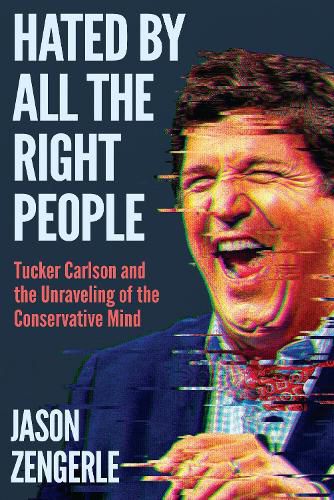Readings Newsletter
Become a Readings Member to make your shopping experience even easier.
Sign in or sign up for free!
You’re not far away from qualifying for FREE standard shipping within Australia
You’ve qualified for FREE standard shipping within Australia
The cart is loading…






From a seasoned political journalist, an eye-opening examination of Tucker Carlson's rise through conservative media and politics, and his ideological transformation over the past thirty years, tracking the concurrent shifts in the political and media landscapes which have both influenced and succumbed to the hyperpartisan politics of today.
To many, Tucker Carlson is synonymous with modern conservative politics. Carlson has been present on our screens for almost three decades and is as infamous for his bow tie as he is for his increasingly extreme right-wing views. But those who knew Carlson in his earlier days in political journalism remember a very different man-a serious and gifted writer and commentator who enjoyed debating with liberal friends and calling out conservative failures in equal measure. Now after watching Carlson turn away from measured reporting, while simultaneously gaining unparalleled power in Donald Trump's Republican Party, most are left asking, What the hell happened to Tucker?
New York Times Magazine writer Jason Zengerle's rich and evocative character study of Carlson tells the story of how the former Fox News talking head rose through the ranks of conservative media, from his early days as a young writer at The Weekly Standard to his current perch as one of the most powerful voices in right-wing politics. Through deep reporting and a sweeping view of the political and media landscapes over the past thirty years, Zengerle reveals how Carlson's career offers a unique lens into the radical transformation of American conservatism and, just as importantly, the media that covers and ultimately shapes it. As conservative news outlets fight daily over who can report the most disreputable stories, and clicks and views take precedence over facts and substance, Carlson's evolution tells the larger story of how the right has radicalized and taken the media with it.
$9.00 standard shipping within Australia
FREE standard shipping within Australia for orders over $100.00
Express & International shipping calculated at checkout
Stock availability can be subject to change without notice. We recommend calling the shop or contacting our online team to check availability of low stock items. Please see our Shopping Online page for more details.
From a seasoned political journalist, an eye-opening examination of Tucker Carlson's rise through conservative media and politics, and his ideological transformation over the past thirty years, tracking the concurrent shifts in the political and media landscapes which have both influenced and succumbed to the hyperpartisan politics of today.
To many, Tucker Carlson is synonymous with modern conservative politics. Carlson has been present on our screens for almost three decades and is as infamous for his bow tie as he is for his increasingly extreme right-wing views. But those who knew Carlson in his earlier days in political journalism remember a very different man-a serious and gifted writer and commentator who enjoyed debating with liberal friends and calling out conservative failures in equal measure. Now after watching Carlson turn away from measured reporting, while simultaneously gaining unparalleled power in Donald Trump's Republican Party, most are left asking, What the hell happened to Tucker?
New York Times Magazine writer Jason Zengerle's rich and evocative character study of Carlson tells the story of how the former Fox News talking head rose through the ranks of conservative media, from his early days as a young writer at The Weekly Standard to his current perch as one of the most powerful voices in right-wing politics. Through deep reporting and a sweeping view of the political and media landscapes over the past thirty years, Zengerle reveals how Carlson's career offers a unique lens into the radical transformation of American conservatism and, just as importantly, the media that covers and ultimately shapes it. As conservative news outlets fight daily over who can report the most disreputable stories, and clicks and views take precedence over facts and substance, Carlson's evolution tells the larger story of how the right has radicalized and taken the media with it.